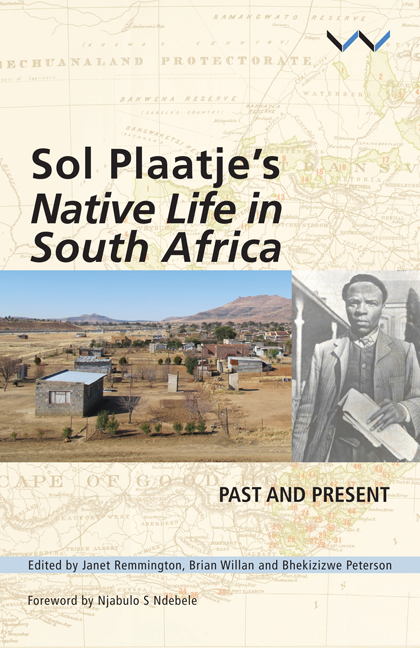Book contents
- Frontmatter
- Table of Contents
- Acknowledgements
- Foreword: Sol T Plaatje and the ‘power of all’
- Introduction: Native Life in South Africa – then and now
- Editions of Native Life in South Africa: 1916 to the present
- Looking Back: Foreword to Ravan Press edition of Native Life in South Africa, 1982
- Poetic Tributes
- A Contemporary Reimagining: The Road to Dikhudung
- Contributors
- Plaatje Resources
- List of Figures
- Index
Looking Back: Foreword to Ravan Press edition of Native Life in South Africa, 1982
Published online by Cambridge University Press: 21 April 2018
- Frontmatter
- Table of Contents
- Acknowledgements
- Foreword: Sol T Plaatje and the ‘power of all’
- Introduction: Native Life in South Africa – then and now
- Editions of Native Life in South Africa: 1916 to the present
- Looking Back: Foreword to Ravan Press edition of Native Life in South Africa, 1982
- Poetic Tributes
- A Contemporary Reimagining: The Road to Dikhudung
- Contributors
- Plaatje Resources
- List of Figures
- Index
Summary
It is possible that no other legislation has so deeply affected the lives of black people in South Africa as the Natives’ Land Act of 1913. It created overnight a floating landless proletariat whose labour could be used and manipulated at will, and ensured that ownership of the land had finally and securely passed into the hands of the ruling white race. On it rest pass laws, the migratory labour system, influx control and a thousand other evils which affect the lives of black people in South Africa today. The passing of the Natives’ Land Act was devastating enough to evoke, for the first time, organised black protest of an intellectual kind. It stirred into existence the newly-founded South African Native National Congress (which later became the African National Congress) and gave voice to a new class, a black elite educated for the most part by missionaries in the British liberal tradition.
Sol Plaatje writes of an era in South African history almost unknown to succeeding generations. The wars for the land – spear and shield against cannon and gun – are over and he unfolds the history of a mute and subdued black nation who had learned to call the white man ‘baas’. The population at that time is about 1¼ million whites to about 5 million blacks. The black population is domiciled and occupied in various ways – in locations and reserves, in urban areas, in public service building roads and railways, or working on farms. But in vast tracts of the rural areas of the Cape Colony, the Orange Free State and the Transvaal, a kind of zamindari system is in operation. About one million black people are squatters on ‘European’ farms. Having no land of their own, they hire a farm, or grazing and ploughing rights, from the white landowner. It is this population of one million squatters on European farms who are immediately hard hit by the Natives’ Land Act.
Prior to the introduction of the Natives’ Land Act of 20 June 1913, the Pass Law was introduced for the first time on 28 February 1913. Its aims were to prohibit black people from wandering about without a proper pass, from squatting on farms, from sowing on the share crop system. It facilitated the introduction of the Natives’ Land Act.
- Type
- Chapter
- Information
- Sol Plaatje's Native Life in South AfricaPast and Present, pp. xxxvii - xlPublisher: Wits University PressPrint publication year: 2016



